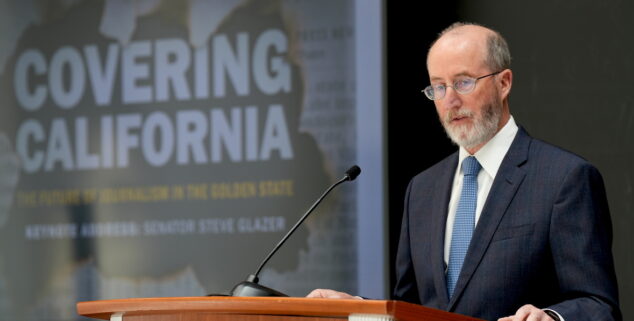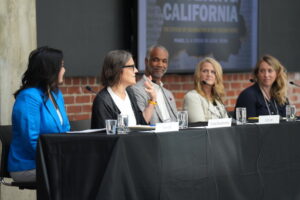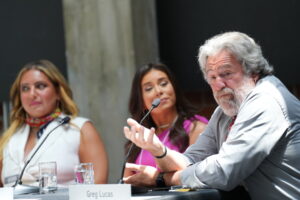News
The future of journalism? A lot of uncertainty.
 Senator Steve Glazer. Photo by Joha Harrison, Capitol Weekly
Senator Steve Glazer. Photo by Joha Harrison, Capitol WeeklyPanelists at Capitol Weekly’s Covering California: The Future of Journalism in the Golden State conference on Thursday were blunt in their assessment of the news business these days.
“The industry is in such a crisis and an era of collapse,” said Christa Scharfenberg, project director of the California Local News Fellowship Program at UC Berkeley, a state-funded program that places two-year fellows in news gathering operations across the state.
Scharfenberg’s comments came during the first panel, A Crisis in Local News, in which leaders of three California news organizations, the Sacramento Bee; the Sacramento Observer, which cover’s the region’s African-American community; and Fresnoland, a hyperlocal nonprofit that spun off from the Fresno Bee, discussed the growing challenges of funding news in the 21st Century.
Colleen McCain Nelson, the executive editor of the Sacramento Bee and the California regional editor for McClatchy, spoke about a recent Pew Research Center study that found 85 percent of U.S. adults trust local news outlets – but only 15 percent have actually paid for local news in the last year. Worse yet, the study also found that 63 percent of Americans believe their local news outlets are doing “very well or somewhat well financially,” which, of course, is the exact opposite of reality, as local news outlets are closing all over the country at an accelerating rate.
“I don’t think we’ve done a good job of telling our story” to the public McCain Nelson said, adding that news organizations need to rethink and deepen their relationship with readers – who increasingly are becoming a primary source of revenue, instead of advertisers – while also doubling down on prioritizing how they use their resources.
“The industry is in such a crisis and an era of collapse.”
McCain Nelson said McClatchy’s strategy in recent days has been to focus almost entirely on local news. She noted that not that long ago, the Sacramento Bee sent reporters to cover the Olympics or other national or international news events. No more. Now, she said, McClatchy dedicates its limited resources to news in readers’ backyards.
“There aren’t nearly enough journalists covering our communities,” she said.
Indeed, Larry Lee, the president and publisher of the Sacramento Observer, said his publication has made a conscious decision not to cover as many events as before, instead using its limited resources on high-impact stories and other content that readers can’t get elsewhere.
Danielle Bergstrom, the executive director of Fresnoland, said her outlet takes a similar approach, covering wonky policy issues like general plans that don’t often receive much coverage.
The news leaders seemed to agree that this targeted approach to news coverage has helped stretch already thin dollars – but also added that a lot more work still needs to be done.
McCain Nelson, for example, said that the Sacramento Bee has been fortunate to receive some philanthropic support, but that support is only bridge funding while the Bee looks for a new sustainable business model in an era when many consumers get their news from social media and big tech companies profit off of news organizations’ reporting but don’t share the revenues.
In fact, Bergstrom said Fresnoland’s nonprofit status doesn’t insulate her news organization from the harsh realities of the news business today.

Pamela Wu, Christa Scharfenberg, Larry Lee, Colleen McCain Nelson and Danielle Bergstrom. Photo by Joha Harrison, Capitol Weekly.
“I’m don’t have any illusions that our model is better than the for-profit model.”
Lee agreed, saying the only difference between a nonprofit and for-profit news organization is its tax status. Both flavors of news org, he said, “need to be sustainable.”
Which is why Scharfenberg’s fellowship program is viewed as such as boon. Every news organization represented on the first panel participates in Berkeley’s fellowship program, which is 100 percent funded by state dollars.
Scharfenberg said when the program launched she was worried that news organizations would have problems accepting fellows paid by government money. But no one protested, she said – underscoring the dire straits California news organizations are facing in today’s climate, a climate that Scharfenberg candidly described in grim terms.
“Our democracy is truly in peril,” she said with local news dying.
During the second panel (The Business of Journalism – Redefining the Model), Senator Nancy Skinner (D-Oakland) called social media companies and big tech companies using data mining techniques to make profits while not crediting or compensating their media sources “predatory behavior.”
Skinner is the floor manager for Assemblymember Buffy Wicks’ AB 886, the California Journalism Preservation Act, which the Assembly endorsed last year before Wicks turned it into a two-year bill in an effort to get buy-in in the Senate. The measure, now in the Senate Judiciary Committee, would require social media companies to compensate journalism outlets with a usage fee (based on a percentage of advertising revenue) for the content they take.
“The fact is that so many of us get our news from social media, and not because we searched for it but because it was targeted to us by an algorithm,” Skinner said during the panel discussion.
Neil Chase, Chief Executive Officer of CalMatters, also weighed in, citing their research that showed 6 percent of their views come from someone who clicked on a link from Google. Chris Argentieri from the Los Angeles Times reiterated how this problem is exacerbating revenue and funding shortfalls for California media outlets.
“Unless we can get the entities who are taking our content to pay for content how can we find a successful business model?” he said, noting legislation like AB 1327 and AB 886 are critical to help keep local news outlets alive to provide information, accountability and transparency.
Senator Steve Glazer (D-Orinda) delivered the keynote address, speaking passionately about the need for independent journalism and the danger of the hollowing out of media outlets. Glazer referenced James Madison and expressed that “freedom of the press is a bedrock of democracy.”
Senator Glazer also expressed support for The California Journalism Preservation Act, though he said he would like to see some amendments. He did not elaborate.
“Unless we can get the entities who are taking our content to pay for content how can we find a successful business model?”
His recent bill, SB 1327, which proposed a tax credit for small local news organizations funded by imposing a data mitigation fee on large tech companies like Facebook and Meta that mine customer data for targeted ads, stalled in the Senate when it became obvious it did not have the votes to get out of that chamber by last Friday’s crossover deadline.
Glazer said he is nonetheless committed to this mission and emphasized that we have an obligation to mitigate the damage these large companies have done to local journalism by using their content and not compensating them.
“We’ve had setbacks, but we’re not giving up,” he said.
Discussion during the third panel (Covering the Capitol) also focused heavily on social media and government accountability.
Current statehouse reporter Ashley Zavala, president of the Capitol Correspondents Association of California and KCRA California Capitol Correspondent, noting the increasing challenges journalists face in accessing legislators and elected officials and the lack of a dedicated space in the Capitol for reporters to work (a situation currently being addressed by legislative leaders).
“We don’t have enough time to go through all the challenges that reporters covering the Capitol and even the administration have faced in the last couple of years,” she said. “Ever since the pandemic we’ve been in an ultra-hangover of press accessibility and of reporters being able to do their jobs.”
She says the issues are particularly acute when trying to get access to legislative leaders.
“There’s this arrogance in the building where they feel like they don’t have to talk to us anymore because they’re the supermajority and they don’t really need journalists,” she said. “They” of course being Democrats, who hold supermajorities in both the Assembly and Senate.
Politico’s Lara Korte noted how that sometimes backfires.
“If you aren’t candid with reporters…it creates a vacuum of information that gets filled with misinformation,” she said.

Cynthia Moreno, Ashley Zavala and California State Librarian Greg Lucas. Photo by Joha Harrison, Capitol Weekly
Korte cited the example of the intense speculation that surrounded Gov. Gavin Newsom’s decision to not attend a global climate summit in Scotland in 2021, a decision that was made without any explanation at the time.
“It was a lot of crazy stuff – he’s dead or he has COVID or has to have a kidney replacement,” she said. Weeks later he somewhat casually revealed that he stayed home because his kids wanted him to do Halloween with them.
“How hard would it have been and how much damage could he have controlled if he’d just said that up front?” she said.
Former Capitol reporter Cynthia Moreno, now press secretary to Assembly Speaker Robert Rivas, said many in jobs like her want to answer reporters’ questions faster, but are not allowed to do so until the are given the green light by those above them on the food chain.
“Many times there are still negotiations happening among stakeholders,” she says. “So I can’t talk about something until I’m told we’re ready to release that information.”
Former Los Angeles Times bureau chief John Myers, now the chief of public affairs at the California Public Employee Retirement System (CalPERS), said the blame should also not fall solely on lawmakers or others inside the building. He said at least some of the responsibility has to fall on reporters who too often look for negative angles over offering real insight into an issue.
“If you aren’t candid with reporters…it creates a vacuum of information that gets filled with misinformation.”
“The number one challenge we have…is there is a bias toward conflict that is paramount in this place,” he said. “I would argue that context is more important than conflict.”
The line of the day, however, likely came from former Capitol reporter and current California State Librarian Greg Lucas, who in responding to a question how reporters could build better relationships elected officials, noted the growing prevalence – particularly among young people – to get their news from non-traditional sources like social media rather than TV or newspapers.
“Why would I possible worry about creating a good relationship with the media when there are multiple social media platforms where I can put out my message unfiltered.”
Capitol Weekly editor Rich Ehisen and reporters Brian Joseph and Colleen Carbrey contributed to this report. If you missed the conference, all of the individual panels and the keynote address from Sen. Steve Glazer will be available soon on both the Capitol Weekly podcast and Vimeo.
Want to see more stories like this? Sign up for The Roundup, the free daily newsletter about California politics from the editors of Capitol Weekly. Stay up to date on the news you need to know.
Sign up below, then look for a confirmation email in your inbox.

Leave a Reply